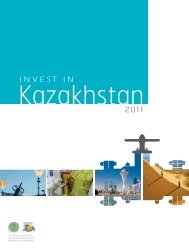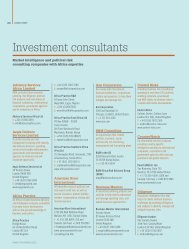NIGERIA Invest in 2012-13 - Newsdesk Media
NIGERIA Invest in 2012-13 - Newsdesk Media
NIGERIA Invest in 2012-13 - Newsdesk Media
Create successful ePaper yourself
Turn your PDF publications into a flip-book with our unique Google optimized e-Paper software.
Oil and the Niger Delta<br />
Nigeria’s oil sector endured an exigent start to<br />
<strong>2012</strong> with rows over fuel subsidies and<br />
protracted regulations. But the controversial<br />
reforms are central to the government’s goal of<br />
secur<strong>in</strong>g the long-term economic future of the<br />
country, says Antony Coll<strong>in</strong>s<br />
When you have a situation where<br />
85 per cent of a country’s export revenues<br />
come from oil, it is fair to say that the<br />
sector is an essential aspect of the<br />
economy. This statistic relates to Nigeria,<br />
one of the world’s largest oil export markets shift<strong>in</strong>g over two<br />
million gallons of oil per day.<br />
Such a high percentage also denotes an over-reliance on<br />
oil. This was made starkly obvious to Nigerian citizens on<br />
OIL, GAS AND MINERALS 105<br />
Government reforms are a vital step<br />
<strong>in</strong> ensur<strong>in</strong>g Nigeria’s oil sector<br />
rema<strong>in</strong>s <strong>in</strong>ternationally competitive<br />
1 January <strong>2012</strong>, when the government made the tough<br />
decision to remove its generous oil subsidy, which had kept<br />
petroleum prices artificially low for years.<br />
This move divided op<strong>in</strong>ion. Supporters claimed the<br />
sav<strong>in</strong>gs would provide billions of dollars of <strong>in</strong>vestment for<br />
ail<strong>in</strong>g <strong>in</strong>frastructure, while opponents were angered at<br />
be<strong>in</strong>g unable to afford to buy petrol after prices more than<br />
doubled overnight. The nature of the removal – a sudden,<br />
s<strong>in</strong>gle slash rather than a phased reduction – has been<br />
hard for many to accept and absorb, but experts such as<br />
Patrick Mgbenwelu, director and head of project and<br />
structured f<strong>in</strong>ance at FBN Capital, the asset management<br />
bus<strong>in</strong>ess of the First Bank Group, believe that the benefits<br />
will become apparent <strong>in</strong> the long term.<br />
“The eventual removal of fuel subsidies will<br />
open up major <strong>in</strong>vestments <strong>in</strong> the Nigerian oil and gas<br />
sector – <strong>in</strong> particular the ref<strong>in</strong>eries and petrochemical sectors<br />
INvESt IN <strong>NIGERIA</strong> <strong>2012</strong>-<strong>13</strong>







